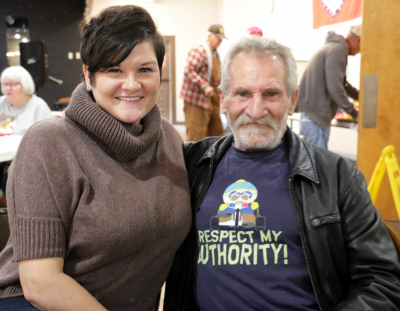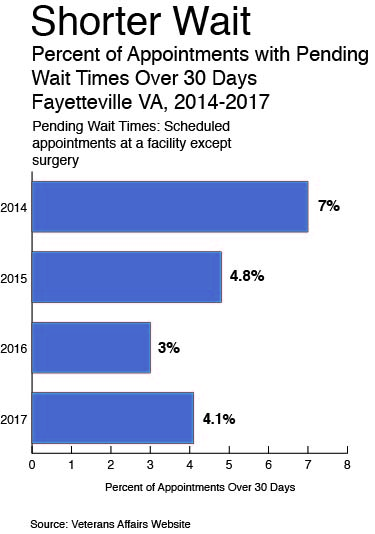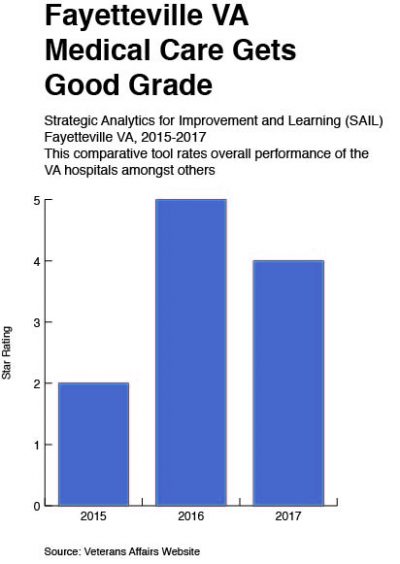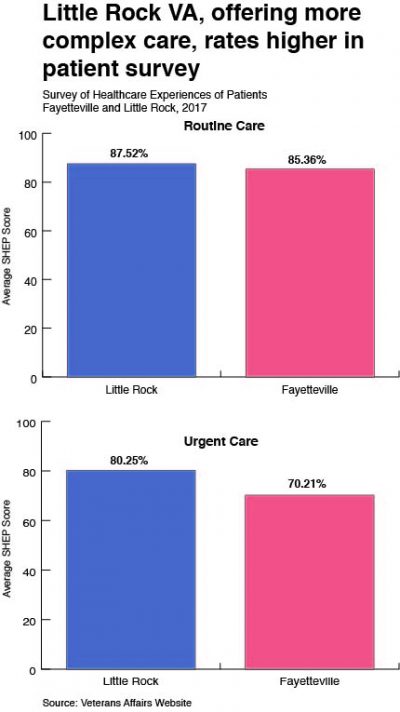VA Health Experiences Vary
By Hermon Negash and Veronica Torres The Razorback Reporter
FAYETTEVILLE, Ark. – Wednesday is chili day at the American Legion. Army veteran Butch Finley pulled a chair and sat down to eat lunch with his daughter. When he was asked about his experiences at the Fayetteville VA hospital, he instantly hung his head.
“On a scale of 1 to 5, I’d give them a one,” Finley said.

Army veteran Butch Finley(right) and his daughter Alex Taylor meet for lunch at the Fayetteville American Legion. Photo by Veronica Torres
Then-VA Secretary Eric Shinseki resigned after the audit was released. The 14-day target for wait times was not attainable, and basing bonuses on meeting the target was an organizational leadership failure, according to the audit.
The VA Office of Inspector General investigated 93 healthcare centers across the country in response to the alleged false wait times.
Investigations confirmed that wait time manipulations were prevalent throughout the VA health system, according to the 2014 Inspector General’s report.
At the Fayetteville VA hospital, pending wait times have decreased since 2014, according to VA data. The percent of wait times exceeding 30 days dropped more than two percentage points from 6.9 percent on Oct. 1, 2014 to 4.8 percent a year later in 2015. It dropped to 3 percent in 2016 and stood at 4.1 percent as of Oct. 1, 2017. 
The Fayetteville VA hospital’s pending wait times are above the Little Rock and Shreveport hospitals but below Memphis as of Oct. 1, 2017. Three percent of the Little Rock VA hospital appointments have wait times more than 30 days; 3.5 percent of appointments in Shreveport are more than 30 days and 6.9 percent of appointments at the Memphis VA hospital wait more than 30 days.
Jason Collins, who owns Doomsday Coffee and Roasterie in Fayetteville, is an Army veteran who gets the majority of his healthcare at the VA. He understands why wait times could be a problem in VA hospitals, he said.
“I’m a little torn because I know the amount of patients they have to see. You have to weigh between wait times and proper care,” he said.
Collins related wait times to the number of veterans who need care and the fact that the United States was at war in Iraq and still has troops in Afghanistan. His solution to help wait times was simple, blunt and straight to the point: Stop sending troops to war.
“The VA is damned if they do and damned if they don’t,” Collins said. “If they start pushing people out, they’re not going to receive proper treatment, things aren’t going to get diagnosed properly and people are going to die. If they take their time with every patient like they’re supposed to, you’ll see longer wait times.”
John Philpott has been going to the Fayetteville Veterans Hospital for 20 years and he thinks they’ve been pretty consistent, he said. Philpott doesn’t visit the hospital often but gets an annual physical exam at the Veterans hospital.
“If they can’t do it in two weeks, I can seek outside care,” Philpott said.
The VA began measuring performance by SAIL (strategic analytics for improvement and learning), to gauge access to care, quality of mental health care, employee perception about the organization, nursing turnover and efficiency. SAIL is used to assess the overall quality of VA hospitals from relative performance compared to other VAs, using a star rating from 1 to 5 and showing performance comparisons from 2015 to 2017.
The Fayetteville Veterans Hospital increased its SAIL rating from a 2 in 2015 to a 5 in 2016 and went back down to a 4 in 2017. John L. McClellan Memorial Veterans Hospital in Little Rock is measured in the same way. In 2015, the Little Rock hospital was rated a 2 and in 2016 increased to a 3 and by 2017 dropped back to a 2, according to the VA.

Patients can give their input on VA services through a survey dubbed SHEP (Survey of Healthcare Experiences of Patients). Veterans complete the survey after their appointment. They answer questions about patient care from the nurses, from the doctors, the hospital environment and their overall experience at the hospital, among other things.
SHEP scores rate primary and specialty care and further rate routine and urgent in each type of care. The Fayetteville VA primary routine care SHEP score is 85.9 percent, according to data. That places ahead of the pack in comparison to other VA clinics and hospitals in Arkansas for routine primary care: Little Rock had an 82.6 percent score; Memphis, 82.7 percent; and Shreveport, 80.3 percent. Most of Fayetteville’s peer hospitals had better ratings for routine primary care: the Mountain Home VA Healthcare System in eastern Tennessee had an 90.5 percent rating and the Muskogee, Oklahoma, VA medical center, a 86.5 percent rating while the VA medical center in Biloxi, Mississippi had an 84.6 percent rating. 
David Stanphill, a Navy veteran who served in Vietnam, had a positive experience with the Fayetteville VA hospital.
“I’ve never been denied any service and I’m always seen in an appropriate amount of time,” Stanphill said. “If I had to get in that day, they’d get me in that day.”
Stanphill is a prostate cancer survivor and the VA helped him, he said.
“I was sent to the best prostate cancer doctor in the country. The VA paid for my airfare, taxi and my hotel,” Stanphill said.
The VA also helped in his payment for his $20,000 surgery; he had a $1,500 copay. Stanphill is not the only veteran to receive help from the VA even though the care was not given directly through the VA.
Others haven’t had the same experience seeking outside care, such as Finley who said he would seek outside care if the VA made it easier.
“I gotta go through a lot of hoops and it’s just a big hassle,” Finley said.
Collins had a favorable experience with the VA. He fell out of a tree stand in a hunting accident that broke his back and sent him to the VA hospital in Kansas City. The VA was unable to help him and sent him to a level one trauma center. His surgery would have cost roughly $40,000 but the VA took care of the bill, Collins said.
All of their positive experiences at the VA hospital made it hard to complain, Collins and Stanphill said. Collins thinks that some veterans failed to put themselves in the nurses’ shoes or the doctors’ shoes, realize the influx of veterans needing care and see things from their perspective, he said.
“In general, people aren’t empathetic. They just see what they’re going through,” Collins said.
Those who have bad things to say about the Fayetteville VA are the people who are impossible to please, Stanphill said.
“It’s frustrating; I appreciate what I receive from the VA,” Stanphill said. Some “take advantage. Some people, you just can’t do enough for them.”